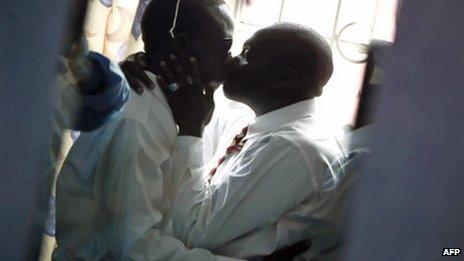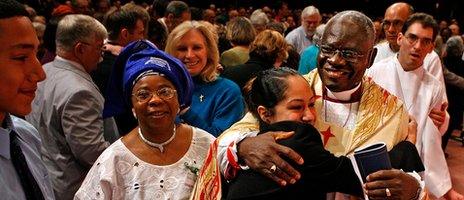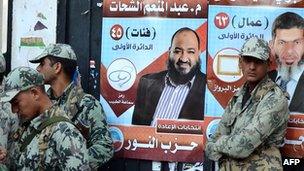Gay rights: Africa, the new frontier
- Published

Gay rights appear to have become a new frontier in diplomatic relations between Western powers and African governments, with the US and UK warning they would use foreign aid to push for homosexuality to be decriminalised on the socially conservative continent.
Addressing an audience of diplomats in Geneva, US Secretary of State Hilary Clinton called for the rights of gay people to be respected.
"Gay people are born into and belong to every society in the world," Mrs Clinton said.
"Being gay is not a Western invention. It is a human reality."
Mrs Clinton did not outline sanctions for countries that fail to reform same-sex laws, but an official memorandum directs US government agencies to consider gay rights when making aid and asylum decisions.
Her comments follow a warning by UK Prime Minister David Cameron last month that the UK would reduce some aid to countries that refuse to recognise gay rights.
Homosexual acts are illegal in most African countries, including key Western allies such as Uganda, Nigeria, Kenya, Egypt and Botswana.
Reacting angrily to Mrs Clinton's speech, Ugandan presidential adviser John Nagenda told the BBC: "That fellow [Mr Cameron] said the same thing. Now this woman [Clinton] is interfering.
"If the Americans think they can tell us what to do, they can go to hell."
Uganda is a staunch ally of the US, receiving military assistance to fight a local rebel group - the Lord's Resistance Army - and has sent troops to Somalia to fight the al-Qaeda-linked al-Shabab group.
Evangelical lobby
Mr Nagenda said Uganda would continue to co-operate with the US on security and other issues, but added: "If they are childish enough to take away aid, we'll see what we do [in response]."
UK-based Justice for Gay Africans campaign group co-ordinator, Godwyns Onwuchekwa, told the BBC that with US Christian evangelical groups increasingly active in Africa, hostility toward gay people has worsened on the continent.
"The evangelical lobby is very powerful and we know that they lobbied Uganda's parliament in 2009 to introduce anti-gay legislation," he said, referring to a private member's bill - which was shelved after a local and international outcry - which called for the death penalty to be imposed for some homosexual acts.

Nigeria's Anglican Archbishop Peter Akinola is at the forefront of campaigns against gay rights
"I won't be surprised if they are also involved in Nigeria, where the Anglican Archbishop [Peter Akinola] has the support of US churches opposed to the ordination of gay bishops."
The Nigerian Senate - dominated by conservative Christian and Muslim MPs - last week approved a bill to further criminalise homosexuality, using Mr Cameron's threat to cut aid to rally public support and to accuse the UK - the former colonial power - of interfering.
The bill, which still has to be passed by the lower house before becoming law, says same-sex couples entering into either marriage or cohabitation would face jail terms of up to 14 years, and those "witnessing" or "abetting" such relationships would also face custodial sentences.
"The only thing that unites Christians and Muslims in Nigeria [where thousands of people have been killed in sectarian conflict] is the oppression of gay people," Mr Onwuchekwa said.
In Egypt, the BBC's Ranyah Sabry says that UK and US calls for homosexuality to be decriminalised will be rejected by all political parties in the North African state - one of the first to be hit by a popular uprising for democratic reforms in the Arab world.
"Their timing couldn't be worse, with the Islamists on the rise [following their victory in first stage of parliamentary elections], but gay rights are totally unacceptable to all political forces - liberals, secularists and Islamists," she says.
"They all respect religion and in Islam it is a well-ingrained belief that homosexuality is not allowed."
A female blogger, 20-year-old Aliaa Elmahdy posted nude pictures of herself on her blog, a Rebel's Diary, and Facebook page in October to argue for reforms that would respect personal choices.

Islamists are on the ascendancy in Egypt
"The Islamists said she should be killed and when she tried to go to Tahrir Square [the focal point of pro-democracy protests] last week, she was beaten and thrown out."
Ms Sabry says she does not expect Washington to jeopardise relations with Egypt - a key regional ally and the biggest recipient of US aid after Israel - over gay rights.
"Nobody is going to support the US on this issue - not even non-governmental organisations. They'll just have to drop it."
Backlash concerns
Some analysts believe that Mrs Clinton's emphasis on gay rights is directed at a liberal domestic constituency ahead of elections next year, and is also intended to counter the growing influence of right-wing evangelical groups in Africa - some of whom have also opposed the use of condoms on a continent with high rates of HIV/Aids.
But Mr Onwuchekwa believes that President Barack Obama's government has little moral authority to promote gay rights in Africa.
"In the US, gay marriages are not recognised in some states. So how does it expect other countries to listen to it?" he said.
Mr Nagenda dismisses suggestions that the US evangelical movement has stiffened Ugandan opposition to gay rights.
"We've had our religions, customs and traditions since time immemorial. This [homosexuality] is taboo."
Mr Onwuchekwa says that while diplomatic pressure can be effective, Western governments would be wrong to cut aid if there was no reform of same-sex laws.
"It will just make it more difficult for gay people who will face a backlash. And poor people will suffer if aid is cut," he says.
"Governments will still be corrupt and politicians will still be rich."
Mr Onwuchekwa said Western governments should instead focus on strengthening human rights groups in Africa.
"It is usually better if people fight for themselves," he says.
Michael Cole-Schwartz from Human Rights Campaign - the largest organisation for lesbian, gay, bisexual and transgender rights in the US - said he doubted that the Obama administration intended to be "punitive" against countries that refused to change same-sex laws.
"I believe that this is sending a strong statement that pro-LGBT [lesbian, gay and bisexual and transgender] policies are those that should be pursued," he said.
"It does not mean that aid is going to be stripped from countries, but it certainly means that the US government is going to promote programmes and promote organisations that are trying to improve the lives of LGBT people."
- Published5 December 2011
- Published2 November 2011
- Published30 June 2011